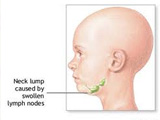|
|
TODAY.AZ / Weird / Interesting
Possible drug targets for common non-Hodgkin's lymphoma discovered
20 July 2011 [20:00] - TODAY.AZ
 Researchers at the University of Maryland School of Medicine have discovered a novel interaction between two proteins involved in regulating cell growth that could provide possible new drug targets for treating diffuse large B-cell lymphoma, the most common type of non-Hodgkin's lymphoma.
Researchers at the University of Maryland School of Medicine have discovered a novel interaction between two proteins involved in regulating cell growth that could provide possible new drug targets for treating diffuse large B-cell lymphoma, the most common type of non-Hodgkin's lymphoma.In a study published online in Nature Communications, the scientists report that they have found a complex molecular and functional relationship between ERK (extracellular signal-regulated kinase), a protein that helps to regulate cell proliferation and survival, and CHK2 (checkpoint kinase 2), a protein that is involved in the cellular DNA damage response. They also demonstrated, for the first time, elevated levels of both proteins in diffuse large B-cell lymphoma cells, compared to non-cancerous cells.
Ronald B. Gartenhaus, M.D., associate professor of medicine at the University of Maryland School of Medicine and the senior author, says researchers found that CHK2 appears to regulate the activity of ERK, although the exact mechanism is not clear. "The two proteins physically interact, which was not known before, and we may be able to use this interaction for therapeutic advantage. We found that treating human B-cell lymphoma cells with both an ERK inhibitor inhibitor and a CHK2 inhibitor killed substantially more cancer cells than treating the cells with either drug alone," he says.
"Based on our findings, we believe that a combination therapy targeting both ERK and CHK2 could offer a potential new approach to treating diffuse large B-cell lymphoma," says Dr. Gartenhaus, who is co-leader of the Program in Molecular and Structural Biology at the University of Maryland Marlene and Stewart Greenebaum Cancer Center.
The drugs used to inhibit ERK and CHK2 caused the cancer cells to die through a process called apoptosis, or programmed cell death. Human cells normally self-destruct in a controlled manner, but cancer cells lose this ability and consequently grow uncontrollably.
E. Albert Reece, M.D., Ph.D., M.B.A., vice president of medical affairs at the University of Maryland and dean of the University of Maryland School of Medicine, says, "This is a very important discovery that may ultimately benefit patients with diffuse large B-cell lymphoma, a common hematological malignancy that can be difficult to treat. These findings provide valuable new insight into the molecular make-up of this cancer that may lead to new targeted drug therapies."
Lymphoma is a cancer that originates in the lymphocytes (a type of white blood cell) of the immune system. Diffuse large B-cell lymphoma is a fast-growing, aggressive form of non-Hodgkin's lymphoma. It accounts for about 30 to 35 percent of all non-Hodgkin's lymphomas, and about 25,000 new cases are diagnosed each year. Non-Hodgkin's lymphomas usually are treated with several types of chemotherapy -- cyclophosphamide, doxorubicin, vincristine and prednisone (CHOP) -- and a biological therapy, such as the monoclonal antibody rituximab (Rituxan). Radiation therapy may be used on occasion, and bone marrow or stem cell transplantation may also be a treatment option.
Dr. Gartenhaus says researchers hope the study findings will help to develop new therapies that will be effective and well-tolerated by patients. "We believe it is important to identify drugs that can improve the efficacy and reduce the toxicity of standard anti-lymphoma therapy," he says.
The new research showed that using compounds to inhibit ERK and CHK2 did not cause any significant damage to normal cells or tissue examined in the lab, according to Bojie Dai, Ph.D., a postdoctoral fellow at the University of Maryland School of Medicine and the lead author. "We hope that new therapies directed at these two proteins would have modest side effects because they would target only the lymphoma cells," Dr. Dai says.
Dr. Gartenhaus says that researchers don't know yet whether the interaction between ERK and CHK2 occurs in other types of lymphoma.
The study was funded by a grant from the National Institutes of Health and a Merit Review Award from the U.S. Department of Veterans Affairs.
/Science Daily/
URL: http://www.today.az/news/interesting/90942.html
 Print version
Print version
Views: 1868
Connect with us. Get latest news and updates.
See Also
- 06 December 2024 [22:20]
Are scented candles harmful to health? - 23 November 2024 [14:11]
Magnitude 4.5 earthquake hits Azerbaijan's Lachin - 20 November 2024 [23:30]
Launch vehicle with prototype of Starship made its sixth test flight - 27 October 2024 [09:00]
Fuel prices expected to rise in Sweden - 24 October 2024 [19:14]
Turkiye strikes terror targets in Iraq and Syria - 23 October 2024 [23:46]
Kazakhstan supplied almost entire volume of oil planned for 2024 to Germany in 9 months - 23 October 2024 [22:17]
Taiwan reported passage of Chinese Navy aircraft carrier near island - 23 October 2024 [21:50]
Russia remains largest oil supplier to India - 16 October 2024 [17:54]
Gamesummit co-founder shares insights on future of gaming industry in Azerbaijan [EXCLUSIVE] - 12 October 2024 [18:27]
TikTok cuts jobs, turns to AI for content moderation
Most Popular
 Pashinyan plants a pig for the Armenians
Pashinyan plants a pig for the Armenians
 Changing global geopolitics & implications for Pakistan
Changing global geopolitics & implications for Pakistan
 U.S. finalizes US$4.7 bln in CHIPS Act subsidy to Samsung Electronics
U.S. finalizes US$4.7 bln in CHIPS Act subsidy to Samsung Electronics
 Turkish FM meets Syrian leader in post-Assad era
Turkish FM meets Syrian leader in post-Assad era
 Gloveman: Macron and his one-time premieres
Gloveman: Macron and his one-time premieres
 New Zealand rejects plan to introduce its own passports for residents of Cook Islands
New Zealand rejects plan to introduce its own passports for residents of Cook Islands
 Azerbaijani ambassador discusses climate cooperation with Iranian officials
Azerbaijani ambassador discusses climate cooperation with Iranian officials
